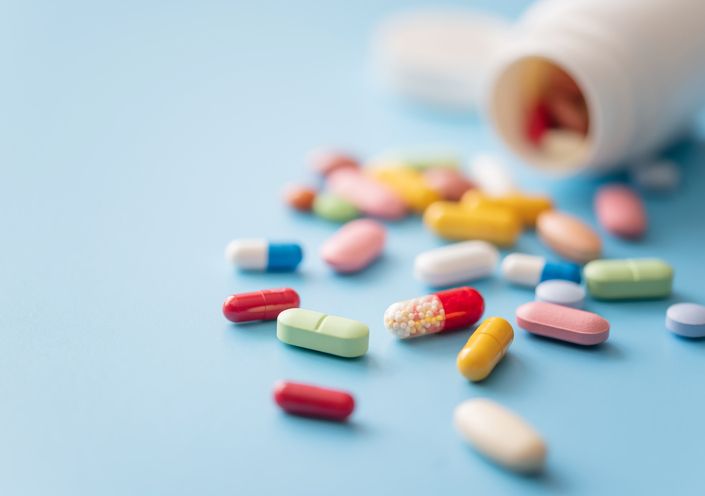
Author: Natalie Ng|Updated: 12 May 2025
Diet pills are often seen as a quick way to lose weight. Some people think they’re all FDA-approved or that natural ones are always safe. Others expect them to work the same for everyone. But no pill can do the work on its own. Even with weight loss medication, real change still comes from how you eat, move, and take care of your health. Some pills might help with appetite or how your body handles fat, but they won’t undo a high fat meal or melt away body fat overnight. And they’re not risk-free, with side effects including liver damage, high blood pressure, and problems with the digestive system, especially if you’re already dealing with other health issues. If you’re considering weight loss drugs or supplements, it’s important to know what’s fact and what’s just hype. Keep reading to break down the biggest myths — and get a clearer picture of what really supports healthy weight.

All Diet Pills Are FDA-Approved and Safe

Why this isn’t true
A lot of people think diet pills are FDA-approved by default, especially if they’re easy to find in stores or online. But most over-the-counter weight loss supplements aren’t approved or tested by the Food and Drug Administration. They're treated more like food than prescription drugs, which means companies don’t need to prove they’re safe or effective before selling them.
Some of these pills have been found to contain hidden ingredients that raise the risk of liver injury, high blood pressure, or problems with the digestive system. These risks aren’t always listed on the label, and the side effects can be serious — especially for people with kidney diseases or other health conditions.
What makes prescription drugs different
Prescription weight loss medications like phentermine topiramate or orlistat go through strict FDA testing. They’re only prescribed if you have a high body mass index or health risks like heart disease or high blood pressure. These drugs are part of a full treatment plan that includes a reduced calorie eating plan and regular physical activity.
So while some weight loss medicine can help, not all products on the market are equal — and not all are safe. Always check the source, and talk to a doctor before using anything that affects appetite, bowel movements, or how your body absorbs fat.

Diet Pills Affect Everyone Differently
Effects depend on your body, not the pill
Many expect diet pills to work the same for everyone, but that’s rarely the case. Weight loss medication interacts with your body based on your metabolism, body weight, age, and existing health conditions.
Some people notice stronger effects from appetite suppressants or fat blockers. Others barely respond, even at the same dosage. The difference often comes down to genetics, hormone levels, or how quickly your body processes drugs.
Personal health factors change the outcome
Prescription medications, including weight loss drugs, can react with other drugs you’re already taking. People with high blood pressure, digestive issues, or kidney diseases may experience different results — or greater risk. A high fat meal, low fat diet, or skipped meals can also shift how your body absorbs the drug.
This is why weight loss supplements and prescription medications aren’t designed for blanket use. Your doctor reviews your health background, current medications, and BMI before recommending anything. One product might help someone lose weight safely, but cause severe liver injury or no change at all in someone else.
Book Now to Experience
S6 Body Sculpting Treatment
1 Minute Self-Registration
Date should not be before minimal date

Natural Diet Pills Still Cause Side Effects
“Natural” doesn’t always mean safe
There’s a common belief that natural diet pills are risk-free just because they come from herbs or plant-based ingredients. But natural substances can still cause strong reactions — some can be just as harmful as synthetic drugs.
Many natural weight loss supplements contain ingredients that affect your heart rate, blood pressure, digestion, or liver. They can also interact with other medications, especially if you’re already treating conditions like high blood pressure, kidney problems, or digestive diseases.
Common side effects from natural ingredients
Some of the most popular natural ingredients in weight loss pills come with serious side effects:
• Ephedra (now banned in many places) can raise blood pressure and lead to heart problems
• Green tea extract, especially in high doses or on an empty stomach, has been linked to liver injury
• Bitter orange, often used in place of ephedra, may cause anxiety, headaches, or dangerous drug interactions
• Garcinia cambogia has been connected to nausea, abdominal pain, and severe bowel movements
Even ingredients found in health food products can trigger strong effects when taken in pill form. That’s why it’s important to treat natural weight loss pills with the same caution as prescription drugs — especially if you have any pre-existing health risks.

Diet Pills Don’t Replace a Healthy Diet
Pills can't take the place of real food
Some people take weight loss pills thinking they don’t need to change how they eat. But even if the pills help reduce appetite or boost metabolism, they can’t give your body the nutrients it needs to stay healthy.
Vitamins, minerals, fiber, and protein don’t come from pills — they come from real food. A healthy diet built on fruits, vegetables, lean proteins, and whole grains supports your immune system, digestive health, and energy levels in a way that supplements can't match.
Long-term results need better eating habits
Diet pills can support weight control, but they don’t teach portion control or how to make better food choices. They also can’t undo the effects of poor eating habits or replace regular physical activity.
Relying on pills without adjusting your diet often leads to weight gain once you stop using them. Your appetite may return quickly, but the eating habits stay the same. That’s why building a low fat diet and balanced eating plan is essential for lasting weight loss.

Quick Results from Diet Pills Don’t Last

Early weight loss is often temporary
Many people see fast results after starting weight loss pills and assume the change will stick. But most of the time, those quick drops in body weight come from water loss or appetite suppression — not fat loss. Once the pills stop, your appetite returns and your body adjusts.
If you haven’t made real changes to your eating habits or activity level, the weight often comes back. In some cases, people gain even more than they lost.
Metabolic rebound and weight regain
When your body loses weight quickly, it can respond by slowing your metabolism to save energy. This makes it harder to burn calories, even after you’ve stopped taking the pills.
At the same time, your appetite may increase, leading to higher food intake while your metabolism is still low. This mismatch creates the perfect setup for weight regain — a pattern seen in many people who rely on short-term diet pills instead of long-term changes.
Water weight returns quickly Slowed metabolism can last weeks or months Calorie intake usually goes back to old levels Appetite control fades once pills are stopped
Weight loss medicine can support your progress, but without regular physical activity and better food habits, the results won’t hold.
Book Now to Experience
S6 Body Sculpting Treatment
1 Minute Self-Registration
Date should not be before minimal date

Expensive Diet Pills Aren’t More Effective
Price doesn’t guarantee better results
There’s a common belief that higher-priced diet pills work better. But research shows that cost has little to do with how well a weight loss pill works. Many expensive supplements contain the same active ingredients as cheaper options — just with different branding.
The price often reflects marketing, packaging, or added fillers, not improved effectiveness. What actually influences results is the ingredient itself, the dosage, and how your body responds to it.
Focus on ingredients, not the label
When choosing weight loss supplements or medications, it’s better to look at what’s in the pill. Some low-cost options meet the same FDA manufacturing standards and include clinically tested ingredients at proper dosages.
Prescription weight loss drugs, which go through a full FDA drug safety communication process, are based on proven effects — not brand hype. Whether a product costs $20 or $200, its success depends on your health profile, not the price tag.

Diet Pills Don’t Burn Fat While You Sleep
Sleep doesn’t boost fat burning the way pills claim
Some diet pills are marketed as overnight fat burners, but this idea doesn’t line up with how the body works. Your metabolism slows down during sleep, which means your body burns fewer calories — not more.
Many of these “nighttime fat burners” rely on stimulants that can actually disrupt sleep. Poor sleep affects hormone balance, appetite, and energy, making it harder to lose weight in the long run.
Stimulants can affect sleep and weight
Some weight loss pills that claim to boost metabolism at night may contain ingredients that raise your heart rate or blood pressure. These effects interfere with your sleep cycle, especially REM sleep, which helps regulate appetite and metabolism.
Lack of quality sleep may lead to:
• More cravings the next day
• Poor food choices
• Slower metabolism
• Higher stress levels and hormone shifts that increase body fat
Even if a pill helps curb appetite during the day, there’s no solid evidence that weight loss supplements can increase fat burning while you sleep. Real weight management still depends on what you eat, how you move, and how well you rest.

Diet Pills Don’t Let You Eat Anything You Want
Pills can’t cancel out poor eating habits
Some people think taking diet pills means they can eat freely without gaining weight. But even with appetite suppressants or fat blockers, eating high calorie meals or ignoring portion sizes can undo any progress.
Weight loss pills may help reduce hunger or block some fat absorption, but they don’t stop your body from storing extra calories if you eat more than you burn.
Food choices still shape results
Uncontrolled eating while on weight loss medication can lead to:
• Slower fat loss or no progress at all
• Digestive issues, especially with pills like orlistat that block fat absorption
• Nutrient gaps from poor food choices
• Strain on the digestive system, liver, or kidneys when mixed with other drugs
For weight loss drugs to work, they need to be part of a reduced calorie eating plan. Diet pills can support weight control, but they can’t replace smart food choices or portion control.
Book Now to Experience
S6 Body Sculpting Treatment
1 Minute Self-Registration
Date should not be before minimal date

Over-the-Counter Diet Pills are as Strong as Prescription Drugs

Prescription drugs follow strict safety and testing rules
Many assume that over-the-counter weight loss pills work just as well as prescription medications. But prescription weight loss drugs go through detailed clinical testing and FDA approval. They’re only prescribed to people with a high body mass index (BMI) or health issues like heart disease or high blood pressure.
Drugs like orlistat, phentermine topiramate, and other prescription medications have been studied for safety, side effects, and effectiveness. That level of testing isn’t required for supplements sold without a prescription.
Over-the-counter pills are less regulated
Most over-the-counter diet pills are considered supplements, not drugs. They can be sold without proven results, and the ingredients don’t need to match what’s on the label. Some may also contain hidden substances that increase the risk of serious side effects, like liver damage or blood pressure spikes.
They often rely on stimulants or herbal blends that haven’t been tested as fully as prescription options, and they can interact poorly with other drugs you’re taking to treat depression, treat alcohol use, or manage chronic conditions.
If you’re thinking about weight loss medication, always speak with a doctor. They can help you find safe options based on your body weight, health history, and goals.

Diet Pills Are All You Need for Weight Loss
Why this belief causes setbacks
It’s easy to think one pill will do everything — suppress appetite, burn fat, and help you lose weight without any other effort. But diet pills only address a small part of what your body needs during weight loss.
They don’t provide protein, essential fats, vitamins, or nutrients that support energy, metabolism, and muscle maintenance. This is especially important if you're on a reduced calorie eating plan or using prescription weight loss drugs that change how your body processes food.
Supporting supplements still play a role
To keep your body working properly during weight loss, you may need additional support:
• Protein helps preserve muscle as body fat decreases
• Vitamin D and B12 assist with energy and metabolic function
• Fiber supports digestion and helps manage appetite
• Omega-3 fatty acids reduce inflammation and protect heart and liver health
Diet pills can be part of a broader weight management plan, but relying on them alone leaves too many gaps. Real progress comes from combining the right food, supplements, physical activity, and long-term habits.

Sustainable Weight Loss Needs More Than Diet Pills

Lasting weight loss takes more than pills
Diet pills can support weight loss, but they can’t replace daily habits that actually help you keep the weight off. Whether you’re taking prescription weight loss drugs or using over-the-counter supplements, the results won’t last without real lifestyle changes.
That means eating fewer calories in a way that still gives your body what it needs — not skipping meals or following extreme diets, but building a balanced, low fat diet that works long term.
Habits that support weight management
To reach and maintain a healthy weight, focus on simple, consistent habits:
• Stay active with regular exercise, even light movement helps burn more calories
• Build meals around whole foods instead of processed ones
• Track your body weight and body mass index (BMI) to understand what’s changing
• Choose realistic goals instead of quick fixes
• Get support from your doctor if you’re starting weight loss medication or have existing health issues
Diet pills may help start the process, but weight management comes from the choices you make each day. That’s what keeps results going long after the pills stop.
Book Now to Experience
S6 Body Sculpting Treatment
1 Minute Self-Registration
Date should not be before minimal date

S6 Body Sculpting: a Safer Alternative to Diet Pills
Diet pills come with risks — S6 doesn’t
While diet pills and weight loss medication can help reduce appetite or fat absorption, they often come with side effects. People using prescription weight loss drugs may experience liver damage, high blood pressure, digestive issues, or even serious problems with the heart, kidneys, or gallbladder. Some ingredients, especially in over-the-counter weight loss supplements, are not fully tested and may interact with other drugs used to treat depression, treat alcohol use, or other health conditions.
S6 Body Sculpting offers a safer, non-invasive approach. It doesn't rely on chemicals, hormones, or stimulants. Instead, it uses a low-energy bio-laser to break down fat cells under the skin. The body naturally removes this fat through the lymphatic system, and there’s no pressure on your liver, digestive system, or blood pressure.
Why S6 is a safer way to lose fat
• No medication, no chemicals — avoids common side effects like nausea, abdominal pain, or liver injury
• No impact on internal organs — safe for people concerned about kidney diseases, blood pressure, or other health problems
• No downtime or recovery period — return to normal activity right after the session
• No risk of drug interactions — ideal for those already taking other prescription medications
• Non-surgical and pain-free — no needles, no scarring, and no skin damage
While weight loss drugs may be effective for some, they are not suitable for everyone — especially those with pre-existing health conditions or concerns about long term use. S6 provides a local, targeted fat reduction method that avoids these risks and offers visible contouring in areas that diet pills can’t change.
If you're looking for a safer, targeted way to reduce body fat without putting stress on your body, S6 Body Sculpting Treatment is a strong choice.
Book S6 today and shape your body without the side effects of weight loss drugs.Book Now to Experience
S6 Body Sculpting Treatment
1 Minute Self-Registration
Date should not be before minimal date
FAQ
1. Can diet pills affect my menstrual cycle or hormone balance?
Yes, some weight loss pills — especially those containing stimulants or appetite suppressants — may interfere with hormone levels. This can affect your menstrual cycle, mood, or energy levels. People with conditions like PCOS or hormonal imbalances should be especially cautious. Always check if the weight loss medication you're considering has been through a complete safety review by the Food and Drug Administration, and consult your doctor before use.
2. Do diet pills affect how other medications work?
They can. Diet pills may interact with other prescription medications, including drugs used to treat depression, high blood pressure, or alcohol dependence. Some ingredients may increase the effects of stimulants or reduce the effectiveness of medications for digestive and kidney diseases. Always let your healthcare provider know about all the medications and supplements you're taking before starting any weight loss medicine.
3. Can I take diet pills if I have a low body mass index?
People with a low body mass index (BMI) are usually not recommended to take prescription weight loss drugs. These medications are generally intended for individuals with a BMI of 27 or higher, especially if they also have obesity-related health problems like heart disease or gallbladder issues. Using these drugs when you’re not medically classified as overweight or obese can lead to serious side effects, including liver injury and metabolic disruption.
4. What happens if I combine diet pills with a high fat meal?
Combining certain weight loss medications like orlistat with a high fat meal may cause uncomfortable side effects such as abdominal pain, urgent bowel movements, or oily stools. This happens because orlistat blocks fat absorption in the digestive system. To reduce these effects, most healthcare professionals recommend following a low fat diet while taking fat-blocking weight loss supplements.
5. Is it safe to take diet pills long term?
Long term use of diet pills is not always safe, especially without medical supervision. Some controlled substances used in weight loss drugs may cause dependency or stop being effective over time. Prolonged use may also increase the risk of health problems such as high blood pressure, liver damage, or kidney problems. It’s important to reassess your weight management plan regularly with your doctor and focus on sustainable habits like regular physical activity and a reduced calorie eating plan.
Recommended Articles
COPYRIGHT© NEW BEAUTY MANAGEMENT LIMITED 2026. ALL RIGHT RESERVED.




